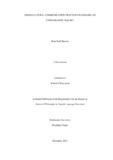
Please use this identifier to cite or link to this item:
https://hdl.handle.net/20.500.14301/312| Title: | CROSS-CULTURAL COMMUNICATION PRACTICES IN ENGLISH: AN ETHNOGRAPHIC INQUIRY |
| Authors: | Sharma, Rom Nath |
| Citation: | Sharma,R.N.(2022).Cross Cultural Communication Practices in English: An Ethnographic Inquiry. |
| Issue Date: | 2022 |
| School: | SOED |
| Department: | DOLE |
| Level: | M.Phil. |
| Program: | Master of Philosophy (MPhil) in English Language Education |
| Abstract: | This research study explored how English language teachers’ cross-cultural communication practices facilitate meaningful learning and effective communication in English language and communication teaching cross-cultural classrooms. This study is based on the paradigm of interpretivism and criticalism following ethnographic inquiry as the research method. I selected one Bachelor of Business Administration (BBA) class of a constituent campus of Tribhuvan University as the research site where a university lecturer taught Business Communication in English to the students of the class. There were students from diverse linguistic and cultural backgrounds. I collected data through class observations and open-ended interviews. I used the edited transcription style and enhanced ethnographic writing style. Hall’s communication theory and Vygotsky’s sociocultural theory supported analyzing the data to infer the research insights. I analyzed the data by applying inductive and deductive approaches. Hall’s communication theory helped me to explore how meaning and concept are affected by different cultural contexts. It guided the understanding of how mother tongues and cultures of the students affect in language learning and communication process. This theory informed the examination of the aspects of non-verbal communication of the learners in the classroom communication situation. Vygotsky’s sociocultural learning theory enabled me to dig out how social interactions and shared learning practices of the learners create an effective learning environment. Both Hall’s communication theory of learning and Vygotsky’s sociocultural learning theory contributed to the analysis of data from socio-cultural perspectives. The study explored how learners’ mother tongues and cultures affect the interpretation of the meaning, understanding the concept, decoding the message, English language learning, and intrapersonal and interpersonal communication. Cultures of the learners cause individual differences in their interactive practices, classroom participations, learning process, learning development and behavioral traits. This study examined how linguistic and cultural primacy, and cultural inharmony prevail in the cross-cultural communication context. The study revealed that learners engage actively in classroom participations, interactive learning activities, shared learning practices, meaningful language learning and effective communication process when the ownership of learning environment is created effectively and the issues related to cross-cultural communication are addressed properly. |
| URI: | https://hdl.handle.net/20.500.14301/312 |
| Appears in Collections: | Dissertation |
Files in This Item:
| File | Description | Size | Format | |
|---|---|---|---|---|
| Rom's MPhil Dissertation_Final_Dec. 28, 2022.pdf | 1.06 MB | Adobe PDF |  View/Open |
Items in DSpace are protected by copyright, with all rights reserved, unless otherwise indicated.